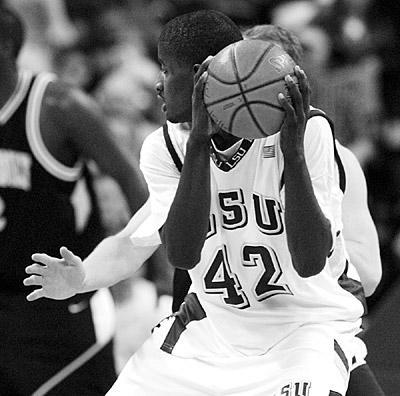The time was here.
Out of the shadows of NCAA sanctions and with four starters coming back in 2003, the LSU basketball team was ready to make a run similar to the success of 2000, when the Tigers shared the Southeastern Conference title and advanced to the Sweet 16 of the NCAA Tournament before being ousted by Wisconsin.
All-SEC performer Ronald Dupree passed on the riches of the NBA to lead LSU to the promised land with fellow seniors Collis Temple III, Torris Bright and Brad Bridgewater primed to do the same. The 2002 National Junior College Player of the Year Jaime Lloreda was also a welcome addition, as well as 2002 Louisiana Mr. Basketball, Darrel Mitchell.
But with five games remaining on the SEC slate and the SEC Tournament in New Orleans still to be played, the Tigers stumbled out to a 3-8 SEC record, in danger of not reaching the NCAA Tournament.
“It has been kind of hard because we know we are a better team than this,” Temple said. “We expect to do better than this.”
The Beginning
Coming out of the gates, it appeared the Tigers were prepared to meet the pre-season expectations of the fans and media, who selected LSU to finish third in the SEC West.
Head coach John Brady’s club came out on fire, starting 12-2 on the season.
Two of the wins came over then- No. 1 Arizona and then-No. 7 Mississippi State in the PMAC before national television audiences, and the buzz around Baton Rouge revolved around the LSU basketball team.
But warning signs came early that controversy would follow the Tigers.
Junior center Shawnson Johnson, a heralded junior college transfer and 6-foot-9 shot blocker, promptly quit the team at halftime of the Delaware State game on Dec. 3 because of what he perceived as a lack of playing time.
Temple said the loss of Johnson was big but really did not affect the Tigers like some may have thought it would.
“The fact that Shawnson Johnson is not here, I have always said hurts us because of his presence on the defensive end,” Temple said. “Blocking shots is something we lost when Shawnson left. And he can score inside also. But I don’t think it has really affected us that much because that happened so early on in the season it wasn’t like we missed him a whole, whole lot.”
Johnson was not the only player to leave, however. Point guard Courtney Trask, expected to be a solid contributor off the bench, quit the team. Fellow guard Tony Gipson, who shots 5-of-8 from the floor for 14 points in a 112-65 win over Centenary, was ruled academically ineligible.
Even with the loss of these players, the Tigers garnered the No. 23 ranking in the AP poll after the win over MSU and looked set to inflict damage on the SEC before the Ole Miss matchup.
The Ole Miss Game
Ole Miss came to town Jan. 18, and left Baton Rouge with the Tigers in a shooting funk and on a losing streak.
“We were just kind of playing flat,” Temple said of the Ole Miss game and the Arkansas loss that followed. “We did not have an intensity level about us, and we were missing something.”
After the 67-57 loss to the Rebels, LSU lost four more consecutive games to SEC opponents who followed Ole Miss’ blueprint to stopping the Tigers — make them shoot free throws and make them beat an effective zone.
As a team, the Tigers shot 38.7 percent from the field and 56 percent from the free throw line, deficiencies that brought about more fouls from the opposing team and more zone defense. Before the losing streak, the Tigers shot 52 percent from the field and 67 percent from the free throw line.
“We were running OK offense,” Temple said. “But we just weren’t making shots. And you get to the point where you say to yourself, ‘I don’t know what else I can do.'”
Temple said the free throw problems were an obvious disadvantage.
“You foul people that you think are not going to make free throws,” Temple said. “If they [whoever is missing free throws] are a big part of the other team’s offense, that strategy can work to your advantage. The guys who were not shooting free throws well understood if they get put on the line, they have to make shots. And that is a mental aspect of the game.”
The Remainder
The Tigers play five more SEC games, all against unranked opponents, before the start of the SEC Tournament of March 13.
LSU is playing better of late, winning two of four games, losing in the waning moments at Auburn and putting up a respectable fight against No. 3 Kentucky in Lexington, Ky. Despite that, Temple said winning the five remaining games will be the only way for the Tigers to get an invite to “March Madness.”
“We all believe that we can win these last five games and go 8-8 and be .500 and go to the NCAA Tournament without the help of winning four games in a row at the SEC Tournament,” Temple said. “We have to win eight. I don’t think they [NCAA] will take a 7-9 team. It would be nice if it [NCAA] did, but hopefully, we won’t be in that position in the first place.”
He said the Tigers are prepared to do just that.
“I think we were underachieving,” Temple said of the losing streak. “During the SEC season, there were several games where we looked back, and we were like we should have got those. We put ourselves kind of in a trickbag here at the end of the season by having to win games, but we did it to ourselves, and we have to get ourselves out of it.”
Tigers hope to run the table
February 19, 2003

Tigers hope to run the table



